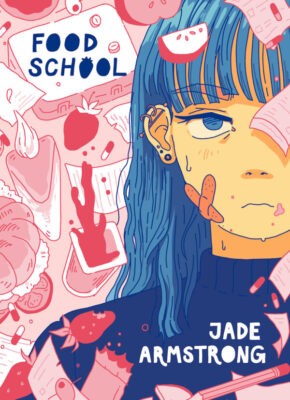For readers who haven’t had much exposure to people struggling with eating disorders, or ED, Food School may feel like just that – a quick eighty-page education in the mechanics of ED psychology. This short, raw, slice-of-life story follows Olive, a young person beginning a recovery program to deal with these issues. Author and illustrator Jade Armstrong pivots between trauma jokes, confession, and explaining how disordered eating and exercise play out emotionally, adding a bit of raunchy, self-deprecating humour and visual gags to lighten the didactic load.

Food School
Jade Armstrong
Conundrum Press
$15.00
paper
80pp
978177620962
Maybe a little surprisingly, manga is an excellent fit for Food School’s subject matter. The format places the simultaneous silliness and seriousness of characters’ internal muddles into stark relief, frame by frame. Armstrong deftly reveals how our own compulsions can twist us into patterns of thinking that are at once terribly grave and utterly absurd, drawing heavily on the comic technique of graphically externalizing characters’ emotional states and preoccupations.
Much of what happens in Olive’s story does so in hyperbolic reactions and explosive outbursts of feelings so big they swirl in the air around characters’ heads – halos of cupcake and candy! Freakouts that break out of frame! Rage that sends facial features right off a character’s head! Even outside the mind, the world of Food School is cacophonic. Armstrong’s shaggy linework names sounds to make the work more multidimensional and sensory – the “skree” of a character’s chair being pulled out, a transcribed inhale, the clatter of a tray being set down – and to mirror the chaotic noise of obsession. This style broadcasts the turbulent mental landscape of someone struggling with ED, highlighting how food-related preoccupations can colour their perception of the world around them.
While much of the story unrolls inside its protagonist’s mind, Armstrong also highlights the interpersonal nature of recovery. Olive’s roommate, for example, serves as a foil to show what a healthy relationship with food can look like as she explains how eating habits shape social ties – shared food can stitch a person into their community, while the interiority of obsession keeps them apart.
But Olive’s recovery from ED isn’t just a matter of education: It’s a war. A counselling session with their therapist is framed like a cartoon boss fight. Olive is forced to literally confront reality, again bending the conventions of manga for insight into the struggle to get well.
Over the course of the work, we watch Olive change alongside their relationships with food and people. After using food to suppress or supplant emotions, they reconnect with their own interiority, and Armstrong’s light touch works well to convey Olive’s mixed joy at learning how to feel things again, even when they hurt.
Manga is very much a genre of the imagination, where anxieties and fears get pulled into the real world as myths or monsters or superpowers. For folks who are already comics fans, Food School is a winner, with storytelling that’s deftly timed in pared-back halftone. And as a tool for people who struggle with or want to learn more about ED, Food School offers a no-shame, judgment-free primer on the challenges of learning how to eat and feel better.mRb






0 Comments